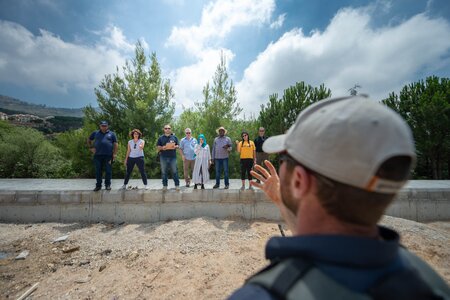Improve the operational capacity of your mine action organisation in the land release process.
Aim
The course aims to empower mine action field managers and personnel by providing them with the knowledge and practical skills needed to plan, manage and execute efficient and effective land release operations in an expert manner, including in relation to non-technical survey (NTS), technical survey (TS), clearance and quality management.
What you will learn?
The course strengthens participants’ capacity to:
- Explain the importance of land release in ensuring community safety and sustainable development;
- Outline the land release process and its key components of NTS, TS and clearance;
- Describe land release NTS operations in accordance with the International Mine Action Standards (IMAS);
- Select techniques and tools for conducting NTS, including community engagement and information gathering;
- Analyse data and prioritise areas for further investigation;
- Plan and manage NTS activities effectively and efficiently;
- Implement TS methodologies to analyse and define the extent of EO contamination and its characteristics;
- Plan and manage different operational methodologies and use of context appropriate tools, including manual, mechanical and animal detection system (ADS) assisted operations;
- Ensure compliance with international standards and protocols;
- Outline key principles of quality management in LR process;
- Explain gender and diversity considerations in the LR process;
- Collaborate with external entities for the verification and validation of land release outputs;
- Demonstrate the principles of transparency and accountability;
- Explain the concept of “all reasonable effort”.
Who should attend?
- Team leader and managers responsible for developing strategy on, executing and overseeing land release operations in the field.
- National Mine Action Authorities, national and international implementing organisations and actors such as the Military or Police where applicable.
Donors
Mandatory e-learning courses to complete
Selected participants are required to complete the following GICHD e-learning courses:
- Introduction to gender and diversity in mine action e-learning course
- Introduction to explosive ordnance risk education (EORE) essentials e-learning course
- Understanding the International Mine Action Standards (IMAS) e-learning course
Language level requirements
Participants should be able communicate and present on their national standards in English. The following standards of proficiency in English should be met (as described in STANAG 6001).
- Listening: good | 3
- Speaking: fair | 2
- Reading: fair | 2
- Writing: elementary | 1
Language requirements are compulsory and should be confirmed by applicants’ superiors.
Equipment requirements
Minimum Technology Requirements
- Computer with up-to-date web browser.
- Google Chrome is recommended
- Mobile phone
Computer Skills
- You will be required to: Navigate the web Interact with the Blackboard Learning Management System
- Utilize word processing software
- Enable audio and video settings on your device(s)
Teaching approach
The course has been designed as a blend of three equally important elements:
- Interactive self-study: articles, videos, quizzes, online discussions and e-learning components.
- Virtual sessions with instructors - interactive discussions and activities, bring more debth to the subject.
- In-person training: practical application of the knowledge and skills learnt.
- Impact assessment survey: the survey will be sent out 9 months after the training to enquire about the impact of the training on the individual and organisational performance.
The following methods are used to make the learning journey the most effective and... enjoyable:
- Scenario-based training: classroom-based and outdoor exercises.
- Peer learning: collaborative learning among participants
- Personalised support.
- Community of practice.
Assessment
- During the course participant performance will be evaluated. The overall grade for the course consists of 3 elements:
- active participation in online self-paced learning and virtual life sessions | 15%
- case studies exercises | 25%
- final written test conducted in the classroom | 60%
- Note: The pre-course baseline test will be released to you during the first week of the self-study phase. You will receive a notification to your emails and instructions on how to complete it. The results of the test do not affect the course final grade.
Travel & Accommodation
The Swiss Government will cover participants’ expenses for food and accommodation while in Stans (arrival date 03 August 2025 and departure date 16 August 2025). Train tickets Zurich Airport – Stans – Zurich Airport will be reimbursed to the participants (only second-class tickets).
A limited number of sponsorships covering travel expenses from country of origin to Stans might be available for applicants with no other funding opportunities from developing countries. Applicants wishing sponsorships for flights must contact the GICHD at pfp(at)gichd.org before registering and no later than the application deadline on 30 March 2025. GICHD may request further information as necessary.
Note: The Swiss Armed Forces do not cover health care expenses. All participants are responsible for adequate insurance (health, accident and liability) or need a Governmental guarantee to cover any health care expenses in Switzerland.
Location
Kompetenzzentrum SWISSINT
Oberdorf Nidwalden
Switzerland
6370

